This year, we compiled an overall, more robust top food and beverage packaging companies list. The list may look different all in one, but there are the same placements near the top. Nestlé, PepsiCo, Anheuser-Busch InBev, JBS and Tyson Foods round out the top 5 with a combined revenue of $262.7 billion. A report by Statista shows that the food and beverage segment revenue is expected to show a healthy annual growth rate (CAGR 2019-2023) of 10.1%.
Turn Up the (Ethical) Volume
Environmental concerns are increasingly influencing consumers’ purchasing decisions, forcing packaged goods companies to rethink the way they wrap their products. Many of the food and beverage packagers on our Top 100 list have moved toward greener packaging, less waste and more sustainable practices — in addition to several tries at brand extensions focusing on healthier options.
Click Here for The 2019 Top 100 Food & Beverage Packaging Company Rankings
For instance, global food giant Nestlé SA just developed new paper packaging for its YES! snack bars — a technology it hopes to extend to other confectionery products as it tries to make all of its packaging recyclable or reusable by 2025.
The new snack bar wrapper, made of paper and a water-based coating to guarantee the same shelf life as plastic, could be used on its existing high-speed lines that seal up to 500 snack bars per minute, Nestlé said. The company rolled out paper packaging for its flavored milk powder Nesquik in first quarter 2019 and will introduce paper-based pouches for its Milo health drink in 2020 as well.
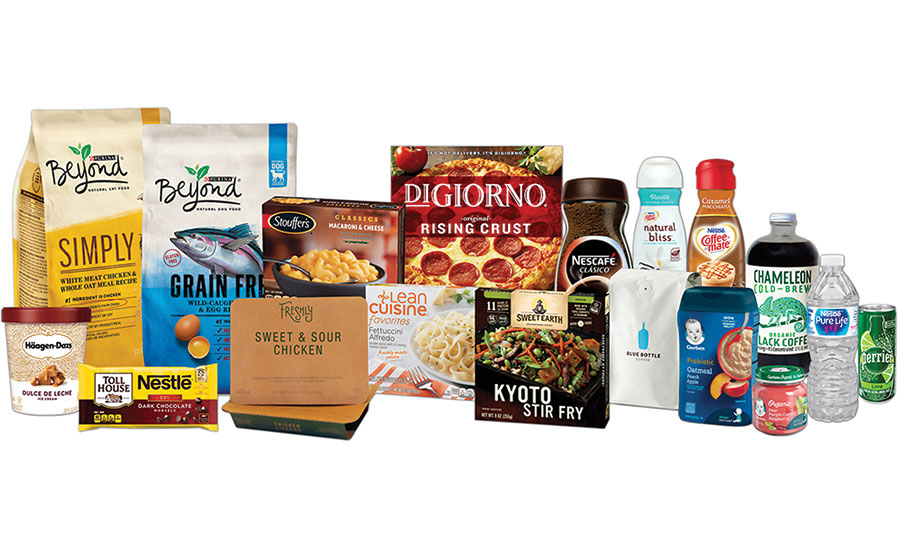
In the beverage sector alone, a report by Exal Corporation stated that 55% of consumers are willing to pay at least 5% more for eco-friendly packaging. And a few on our list have made strides in green packaging.
Molson Coors is following in Anheuser-Busch InBev’s footsteps by testing biodegradable six-pack rings for its beer. Molson Coors said the test forms part of its larger efforts to help solve the global plastics waste crisis. The brewer added it is working on packaging tests in other global markets. AB InBev last year tested the rings on Corona beer in Mexico and the U.K.
Not to be outdone, Diageo’s beer brands, including Guinness and Harp, will replace its plastic ring carriers and shrink wrap with recyclable and biodegradable cardboard. And Carlsberg is using glue technology for its six-packs.
Plant-Based: Fad or Function?
Another growth area for many on our list is the addition of plant-based products. Recently commissioned data from leading market research firm Nielsen shows U.S. retail sales of plant-based foods that directly replace animal products (as defined by GFI) have grown 17% in the past year to over $3.7 billion. With the addition of SPINS U.S. retail sales data on plant-based alternatives in the natural channel, the total U.S. plant-based retail market is worth over $4.1 billion. As more households purchase plant-based options, the market for these products is rapidly expanding well beyond vegetarian and vegan consumers.
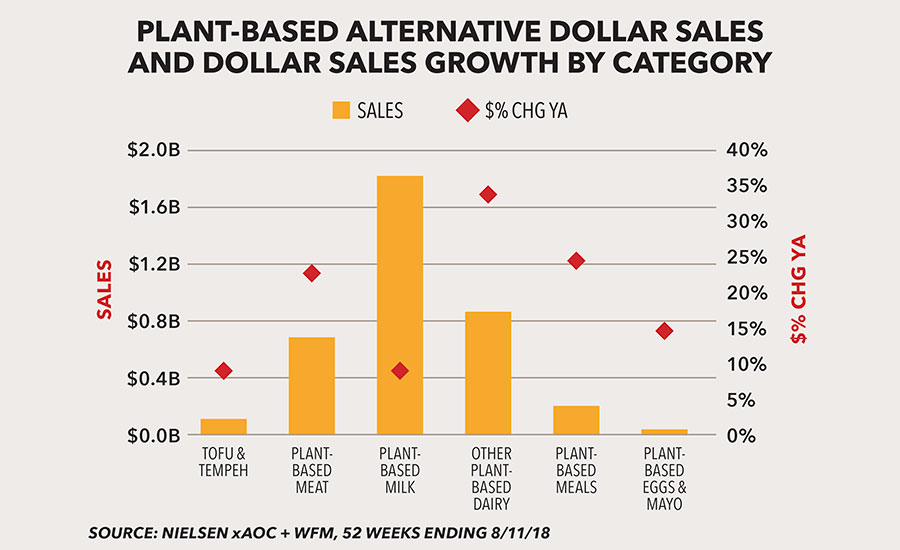
Comparatively, total U.S. retail food dollar sales grew just 2%. Plant-based dollar sales growth has accelerated in the past year compared to the prior year. Previous data from August 2017 showed plant-based dollar sales had grown 8% in the preceding year.
Yogurt giant Chobani just launched nut butter yogurt. The new line, which hit grocery store shelves last month, includes plain Greek yogurt with almond butter, vanilla Greek yogurt with cashew butter, chocolate Greek yogurt with hazelnut butter and other flavors. Eventually, Chobani plans to add a peanut butter product. They could be on to something, as research firm Mintel shows that nut butters are a $3.9 billion market in the United States alone.
Another turn for the brand was the introduction of Chobani Savor, a Greek yogurt condiment that comes in a squeezable, easy-to-use resealable pouch. The company is aiming to reach new consumers with these products.
Nestlé brand Sweet Earth, which it purchased in 2017, has answered consumers’ call for non-meat options with its Awesome Burger. The burger will be available in the fall at grocery stores, restaurants and universities. The food giant also launched a soy- and wheat-based veggie burger under its Garden Gourmet brand in Europe last April.
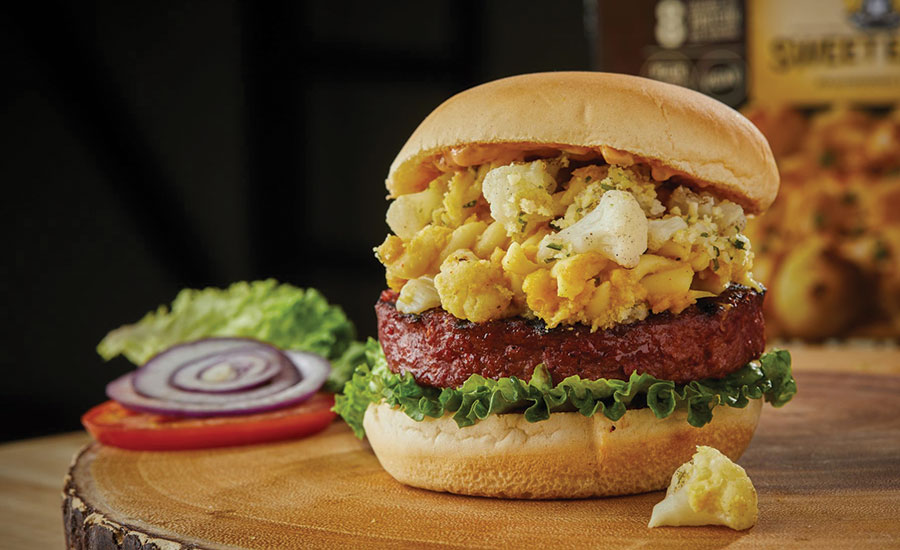
Conagra Foods is expanding its Gardein line of meat-free dishes with new items that feature pea and wheat protein. Products in the line include Chick’n Wings, Tenders and Nuggets; Breakfast Bowls including a vegan eggs Benedict; plant-based sausage; and one-bowl meals in four flavors.
A Nod to Consumers
It seems that 2018 was the product goods companies’ “ah-ha” moment. Many have taken to listening and addressing consumer trends in order to stay at the top. Yet scrambling to make necessary machinery or material changes inside the walls of business.
Nestlé just answered many a consumer desire with its new raw cookie dough that is safe for consumption. The new product is sold in 15-oz. tubs to resemble an ice cream pint. The two flavors are: Chocolate Chip and Chocolate Chip Peanut Butter Monster, which offers a “fan favorite” combination of peanut butter, oats and candy-coated chocolate.
Not going full-fledged plant only, Perdue Foods has launched a blended product: the Chicken Plus line. Chicken Plus consists of chicken nuggets, patties and tenders blended with vegetables. The products contain white meat chicken, cauliflower, plant protein and chickpeas.
And according to sources, PepsiCo has recently sent in trademark applications on a bevy of new products — including fruit-based snack foods, fruit chips, vegetable-based snack foods and veggie chips.
Pet Brands Embark on a New Path
Our Top 100 list also includes pet food — as Mars Petcare Inc., Nestlé Purina PetCare, Hill’s Pet Nutrition, Diamond Pet Foods and General Mills combined last year sold $39.3 billion worth of pet food worldwide. Together they took in 43% of the $91.1 billion and market research firm Euromonitor International believes it was spent on pet food globally. JM Smucker also has pet brands Meow Mix, Kibbles ’n Bits, Gravy Train and Rachel Ray’s Nutrish.
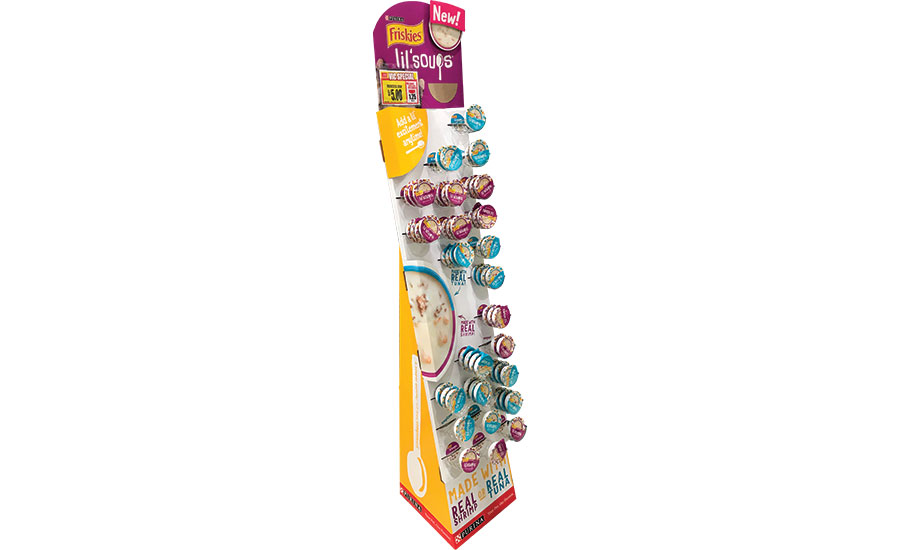
Consumers are upping their pet love and going with premium brands and natural, sustainable ingredients. One such indulgence recently launched is Friskie’s (Nestlé Purina) Lil’ Soups. The cat food complements and toppers come in chicken and butternut squash, shrimp, salmon and tuna.
The packaging for pet foods now uses more earth-friendly designs with paperboard, a recyclable paper FlexziBox flat-bottom bag by Mondi, and even use of Braskem’s sugarcane-based I’m green polyethylene biopolymer.
Bottoms Up
Many beverage companies have addressed consumer demand for drinks with natural ingredients, unique flavors and wrapped with sustainable materials.
Multinational companies leading the soft drink charge include The Coca-Cola Corporation, Pepsi-Co. Inc. and Dr Pepper Snapple. The latest trends reveal that many companies are enlarging or diversifying their product portfolio to include healthier options like bottled water. This trend has mostly been the result of public health concern around high sugar content of soda, sweet tea and other sweetened drinks.
Enter, bottled water companies making changes for consumer satisfaction for recyclable and sustainable materials. A few bottled water manufacturers are moving to aluminum cans. PepsiCo will be using aluminum cans for its Aquafina water (currently in PET bottles) in U.S. food service outlets while it tests the move in retail. The company’s LIFEWTR will be packaged in 100% rPET, and bubly will no longer be packaged in plastic.
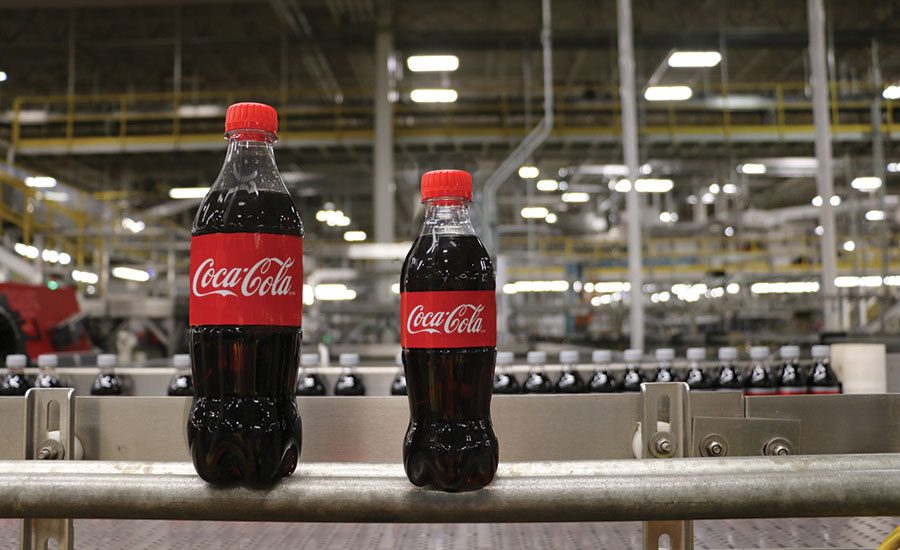
In spring, The Coca-Cola Company introduced us to 100% recyclable, reusable PET bottle minis, 250 ml bottles for some of its beverages. Because its small size can affect the carbonation during the packaging process, the mini bottle uses an innovative coating called FreshSafe, which increases shelf life by up to four months.
Thai Beverage Industry Association (TBA), with the support of The Coca-Cola system in Thailand, Suntory PepsiCo Beverage (Thailand) Company Limited and Nestlé (Thai) Ltd. Company, in partnership with Indorama Ventures Public Company Ltd., have announced their collaboration to further encourage regulation amendment that will allow the use of recycled PET in food and beverage packaging in Thailand.
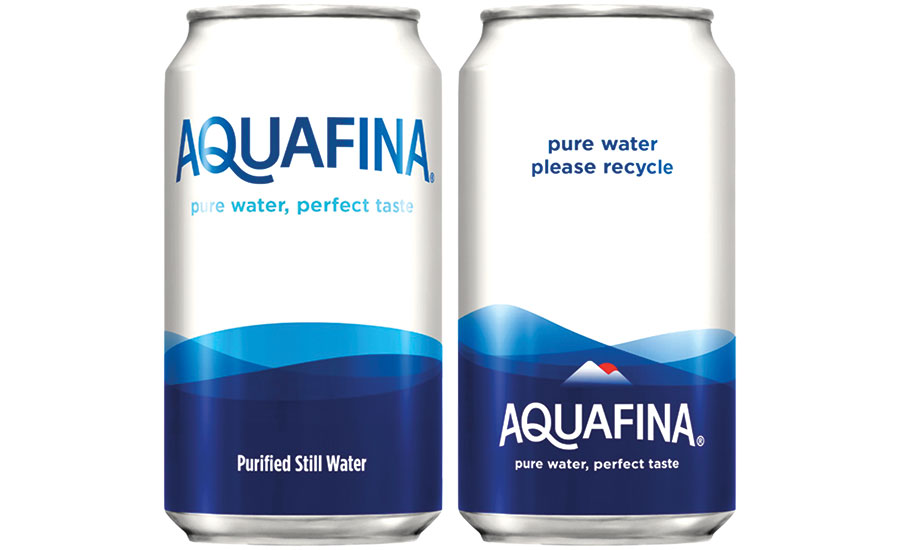
Shaken & Stirred
Craft spirits sales surpassed craft beer recently, and there is no sign of slowing. Craft distilleries saw $3.7 billion in sales in 2018 — 30% more than the previous year — while craft beer had 23% of the beer market in 2018 by revenue, PMMI’s report “A Tale of Two Crafts” showed. New craft beer establishments numbered 7,000 whereas 1,835 craft distilleries opened last year.
One of the more extravagant styles of packaging, spirit companies strive to come out with uniquely styled bottles and drinks with different yet palatable ingredients, all boxed or bottled in the most pristine décor.
A good example, Baileys Irish Cream (Diageo) constantly reinvents its packaging for promotions, seasons and holidays. The most recent design is for its new Tres Leches, a nod to the Latin American dessert. Regional illustrations show on the bottle to round out the theme.
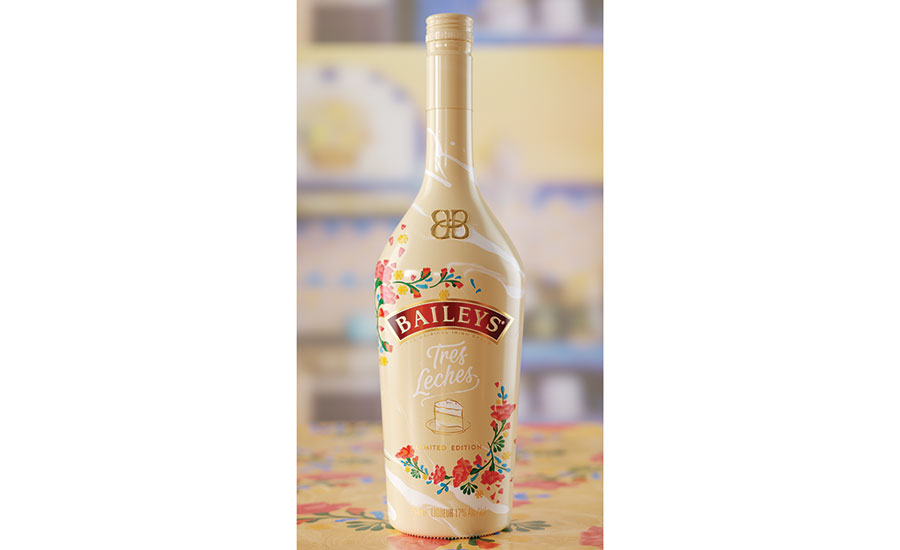
Mergers and Acquisitions
Many food and beverage giants are acquiring other medium-to-large competitors either to consolidate the brands in a specific sector or to add products to their portfolio. Last year was another good year for food and drink industry transactions, with 777 registered in the bevblog.net mergers and acquisitions database.
On our list, Coca-Cola, Kerry Foods, Heineken and Lactalis had the most acquisitions in 2018, according to the bevblog.net food and drink transactions database, with each responsible for at least five takeovers. (Outside of our Top 100 list, JAB, Cavu, Kerry, Waterlogic and Archer Daniels Midland were the others). Diageo, Nestlé, Oetker and Unilever all made four purchases (and Krones, outside of our list).
Nestlé was the only company with five or more sales, followed by Real Good Food (outside of our list) and Tyson Foods on four, and BRF on three. A total of 1,281 companies were involved across 66 countries, with the United States and United Kingdom most prominent overall.
A few to note are Bacardi’s acquisition of popular tequila brand Patrón, Ferrero’s purchase of the Nestlé U.S. candy business and Conagra’s buy of Pinnacle Foods.
2019 Top 100 Food & Beverage Packaging Companies Chart | Top 100 Downloadable Chart
Top Food and Beverage Packaging Companies in the News
More on top food packaging companies | More on top beverage packaging companies
Methodology:
Our Top 100 food and beverage packaging companies list uses sources that include annual company reports, news reports, company websites and direct company contacts. Sales are based on calendar year 2018 or the most recent fiscal year that conforms to that timeframe. We used XE, the online currency counter (xe.com), where necessary. We have also used resources to separate out food and beverage revenue from other segment revenue. Some companies are marked with an asterisk to indicate an estimate when one of the following occurred: It was impossible to get a breakdown of food vs. other segments; it’s a private company and news sources reported the data, not the company directly; or no new information could be found, resulting in reporting 2017’s revenue.


